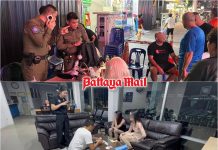Touts record, promises more economic, tourism development
Prime Minister Abhisit Vejjajiva led top Democratic Party officials and candidates in July’s general election on a campaign swing through the Eastern Seaboard, touting the ruling party’s achievements and promising too boost drug suppression and tourism development.
Flanked by Finance Minister Korn Chatikavanij, Deputy Commerce Minister Alongkorn Polabut and MP hopefuls, including Pattaya’s Surat Mekavarakul, Abhisit highlighted the government’s efforts in the past two years, including a five-prong drug-control strategy, free primary education, stipends for senior citizens and price controls on rubber and petroleum.
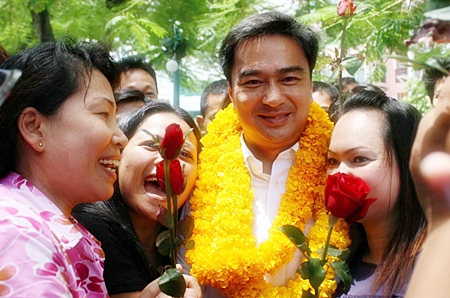 Prime Minister Abhisit Vejjajiva receives a warm welcome from adoring fans as his campaign trail swings through Pattaya. The PM was in town over the weekend to support local Democratic Party candidates, and to elucidate his party’s platform.
Prime Minister Abhisit Vejjajiva receives a warm welcome from adoring fans as his campaign trail swings through Pattaya. The PM was in town over the weekend to support local Democratic Party candidates, and to elucidate his party’s platform.
At campaign stops in Sattahip and Pattaya, the premier promised to accelerate economic development by increasing the minimum wage by 25 percent, expanding Laem Chabang Port and pushing through projects to improve the environment.
“In the previous election, the people of Chonburi showed their confidence for the Democratic Party,” Abhisit said at the May 29 rally on Beach Road, Soi 4. “The east is a critical area and that’s why the government has driven projects to promote and empower industry here.”
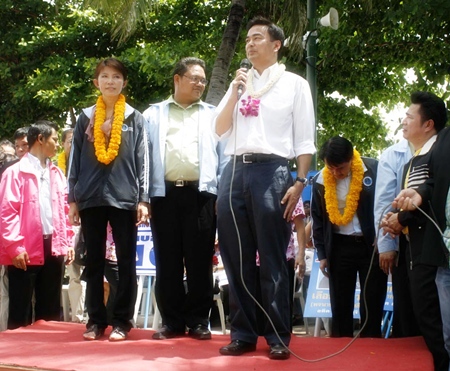 Prime Minister Abhisit Vejjajiva takes to the stage on Beach Road in Pattaya to introduce the local contingent of Democratic Party candidates.
Prime Minister Abhisit Vejjajiva takes to the stage on Beach Road in Pattaya to introduce the local contingent of Democratic Party candidates.
More than 500 people turned out for the rally, many offering the prime minister flower garlands and seeking autographs. Among the crowd were more than 200 Royal Thai Police officers, led by regional commander Lt. Gen. Thangai Pratsajaksattru and Gen. Aswin Kwanmuang, the national police force’s No. 2 official.
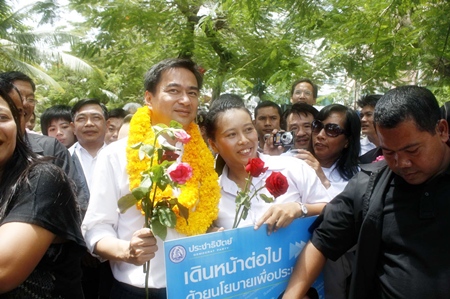 Many supporters turned up to cheer on and have their pictures taken with the PM.
Many supporters turned up to cheer on and have their pictures taken with the PM.
With more than 150 riot police on hand for security, the rally also proved peaceful with just a single red-shirted government opponent trying to push her way toward the premier. The woman, with a small girl also dressed in red in her arms, was turned away.
Abhisit focused most of his comments on past achievements and future promises, but did take a swipe at the red shirts and the Puea Thai Party that supports them.
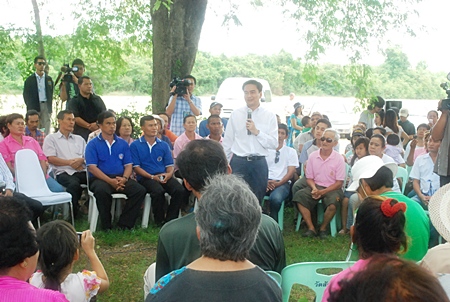 The Prime Minister meets with folks in Sattahip.
The Prime Minister meets with folks in Sattahip.
The prime minister argued that the Democrats have spent their time in office working for the needs of individuals and have built a platform to continue that work if re-elected. By contrast, he claimed, Puea Thai has made changing amnesty laws its primary goal so that fugitive ex-Prime Minister Thaksin Shinawatra can return to Thailand and not be jailed on his corruption conviction.
“The Democratic Party focuses on projects for the people’s needs,” he said.
 Prime Minister Abhisit Vejjajiva holds a talk with people at Wiwat Polamuang School.
Prime Minister Abhisit Vejjajiva holds a talk with people at Wiwat Polamuang School.
Among those projects were the government’s 15 years of free education program, support for a 2.5 million baht budget to promote sustainable tourism, approval of a high-speed train line linking Bangkok with Rayong, and expansion of Laem Chabang Port. If re-elected, Abhisit promised, the government would proceed with wastewater reprocessing projects to improve the environment and income support for farmers.
Drug suppression also remains a top goal for the party. Saying Bangkok and surrounding metropolitan areas still suffer from a severe drug problem, the premier pledged the government would continue to push its “five fences” drug-control policy.
At a stop at Wiwat Polamuang School 3, a drug-rehabilitation facility operated by the Royal Thai Navy in Sattahip, Abhisit noted the Democrats created a unique program that has police work jointly with the military and private sector to control drugs.
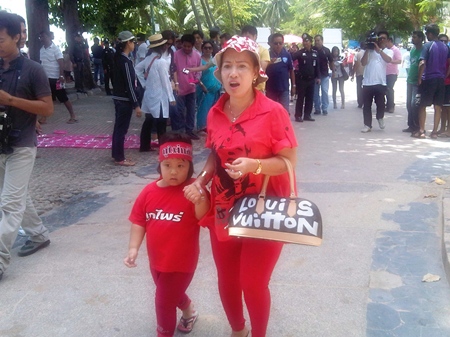 One publicity seeking red shirt protestor and her innocent granddaughter were turned away.
One publicity seeking red shirt protestor and her innocent granddaughter were turned away.
Abhisit said there are five fronts, or fences, in the government’s drug war: Thailand’s borders, the community, society, families and schools. Each fence has to contain drug use within its borders in order for the narcotics plague to be wiped out, he said.
“We have to help each other. Do not assume it’s only the government’s responsibility,” Abhisit told the crowd of more than 200 in Sattahip. “If people cooperate with authorities and take their joint action seriously, the problem can be solved.”



